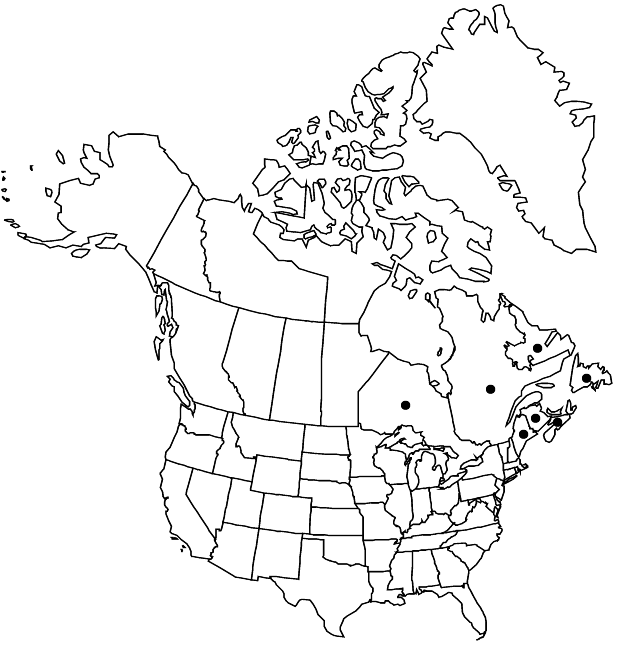Difference between revisions of "Primula laurentiana"
Rhodora 30: 68. 1928 ,.
FNA>Volume Importer |
imported>Volume Importer |
||
| (6 intermediate revisions by 2 users not shown) | |||
| Line 7: | Line 7: | ||
}} | }} | ||
|common_names=Bird’s-eye primrose;primevère laurentienne | |common_names=Bird’s-eye primrose;primevère laurentienne | ||
| − | |basionyms={{Treatment/ID/ | + | |special_status={{Treatment/ID/Special_status |
| + | |code=E | ||
| + | |label=Endemic | ||
| + | }} | ||
| + | |basionyms={{Treatment/ID/Basionym | ||
|name=Primula farinosa var. macropoda | |name=Primula farinosa var. macropoda | ||
|authority=Fernald | |authority=Fernald | ||
| + | |rank=variety | ||
| + | |publication_title=Rhodora | ||
| + | |publication_place=9: 16. 1907, | ||
}} | }} | ||
|synonyms={{Treatment/ID/Synonym | |synonyms={{Treatment/ID/Synonym | ||
|name=Primula mistassinica var. macropoda | |name=Primula mistassinica var. macropoda | ||
|authority=(Fernald) B. Boivin | |authority=(Fernald) B. Boivin | ||
| + | |rank=variety | ||
}} | }} | ||
|hierarchy=Primulaceae;Primula;Primula laurentiana | |hierarchy=Primulaceae;Primula;Primula laurentiana | ||
| Line 29: | Line 37: | ||
|elevation=0-300 m | |elevation=0-300 m | ||
|distribution=N.B.;Nfld. and Labr.;N.S.;Ont.;Que.;Maine. | |distribution=N.B.;Nfld. and Labr.;N.S.;Ont.;Que.;Maine. | ||
| − | |discussion=<p>Primula laurentiana is the octoploid member of a polyploid complex of sect. Aleuritia in North America that encompasses ploidy levels from 2x to 14x. It is most similar to the hexaploid P. incana; it differs in its larger flowers, more open inflorescence, and more robust stature. Both species are heavily farinose and have homostylous flowers. The efarinose form described as forma chlorophylla Fernald is a common variant throughout the range of the species. In coastal northeastern Canada, P. laurentiana blends morphologically and ecologically with P. stricta and crossing between the two is likely; assessment of species identity can be difficult here.</p> | + | |discussion=<p><i>Primula laurentiana</i> is the octoploid member of a polyploid complex of sect. Aleuritia in North America that encompasses ploidy levels from 2x to 14x. It is most similar to the hexaploid <i>P. incana</i>; it differs in its larger flowers, more open inflorescence, and more robust stature. Both species are heavily farinose and have homostylous flowers. The efarinose form described as forma chlorophylla Fernald is a common variant throughout the range of the species. In coastal northeastern Canada, <i>P. laurentiana</i> blends morphologically and ecologically with <i>P. stricta</i> and crossing between the two is likely; assessment of species identity can be difficult here.</p> |
|tables= | |tables= | ||
|references= | |references= | ||
| Line 38: | Line 46: | ||
-->{{#Taxon: | -->{{#Taxon: | ||
name=Primula laurentiana | name=Primula laurentiana | ||
| − | |||
|authority=Fernald | |authority=Fernald | ||
|rank=species | |rank=species | ||
| Line 52: | Line 59: | ||
|publication title=Rhodora | |publication title=Rhodora | ||
|publication year= | |publication year= | ||
| − | |special status= | + | |special status=Endemic |
| − | |source xml=https:// | + | |source xml=https://bitbucket.org/aafc-mbb/fna-data-curation/src/2e0870ddd59836b60bcf96646a41e87ea5a5943a/coarse_grained_fna_xml/V8/V8_584.xml |
|genus=Primula | |genus=Primula | ||
|species=Primula laurentiana | |species=Primula laurentiana | ||
Latest revision as of 22:44, 5 November 2020
Plants 10–48 cm, herbaceous; rhizomes thin, short; rosettes not clumped; vegetative parts usually farinose but sometimes efarinose in age. Leaves not aromatic, indistinctly petiolate; petiole broadly winged; blade without deep reticulate veins abaxially, oblanceolate to spatulate, 3–10 × 0.4–1.3 cm, thin, margins crenate, apex obtuse to acute, surfaces glabrous. Inflorescences 3–12-flowered; involucral bracts saccate, ± equal. Pedicels erect or spreading, sturdy, 5–10 mm, length ca. 2 times bracts, somewhat flexuous. Flowers homostylous; calyx green, campanulate, 5–8 mm; corolla lavender, tube 6–9 mm, length 1.5–2 times calyx, eglandular, limb 10–16 mm diam., lobes 5–8 mm, apex emarginate. Capsules ellipsoid, length 1.5–2 times calyx. Seeds without flanged edges, reticulate. 2n = 72.
Phenology: Flowering summer.
Habitat: Moist open areas, meadows and stream banks on calcareous soils
Elevation: 0-300 m
Distribution

N.B., Nfld. and Labr., N.S., Ont., Que., Maine.
Discussion
Primula laurentiana is the octoploid member of a polyploid complex of sect. Aleuritia in North America that encompasses ploidy levels from 2x to 14x. It is most similar to the hexaploid P. incana; it differs in its larger flowers, more open inflorescence, and more robust stature. Both species are heavily farinose and have homostylous flowers. The efarinose form described as forma chlorophylla Fernald is a common variant throughout the range of the species. In coastal northeastern Canada, P. laurentiana blends morphologically and ecologically with P. stricta and crossing between the two is likely; assessment of species identity can be difficult here.
Selected References
None.